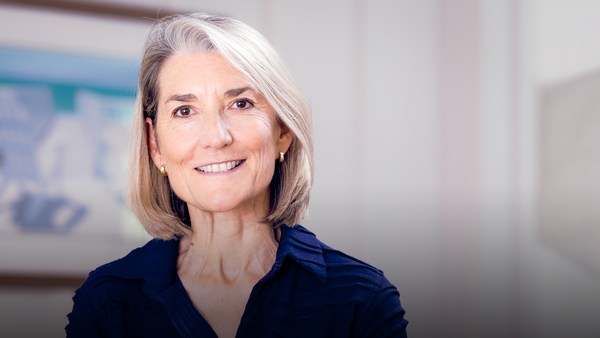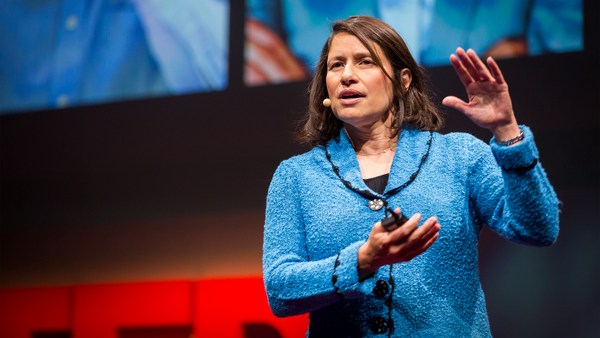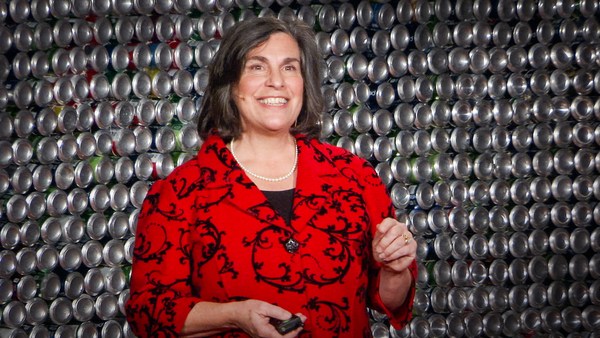When it comes to our careers, the analogy we've been given is a ladder. We're climbing, climbing, climbing, seeing just how high we can get. But if we want to be a part of organizations that are diverse and inclusive and truly reflect the world that we live in, that's simply not enough. While we climb, we also need to lift.
[The Way We Work]
(Music)
It’s no secret that our companies and organizations rarely have leadership teams that represent the communities they serve. That makes them less effective in their work, less innovative and less profitable too. We need more women steering the ship, more people of color at the helm, more folks with disabilities in charge, more immigrants setting the tone, more queer and trans folks calling the shots. So whether you’re a new hire who’s a proud member of one or more of these groups or a longtime leader who is none of the above, each of us has a role to play in making this happen.
Success is no longer about our individual ambitions, but about how we build something greater together. My mother introduced me to this concept of lifting while you climb. She was an absolute powerhouse in her work, and she spent so much of her time working with younger Black women to help advance them, too. She would remind me that the point of success isn’t success for success’s sake. She said that when you climb that ladder and you get to the top, you can take a moment to enjoy the view, but you must be principally concerned with using all of your might to throw the ladder back down for those who are coming behind you. There’s no point in being the first if we’re also the last. So here are three ways that all of us, whether you’re a first in your company or a part of a deep legacy, can embrace this spirit.
One: question your surroundings. One of the benefits, and really the consequences of privilege, is being around people whose experiences mirror your own. So when you're at the table, I want to ask you to really examine who’s there with you, and even more importantly, who isn’t. Do you see women, people of color, people with disabilities, people who look like your customers, clients, patients and community? If not, I need you to ask why. Calling it out matters. If we don't name it, we can't change it.
Once you notice these disparities, let's do something about it. For example, we have a lot of data that women get interrupted during presentations more than men do. So make counting this an activity that you try in meetings where there’s multiple people presenting. Keep a tally: how often do women or nonbinary folks get interrupted, and how often are men getting interrupted? Add up your tally at the end of the week, and if you notice discrepancies, talk about them. Talk about them in the moment. Address it in the meeting if you can. Practice saying, “Hey Fred, I think you interrupted June. June, can you repeat that?” Or if that feels like too much, you can just hand the mic back to June. “Hey June, what were you saying? I think I missed it.” When you notice it happening, speak up. It’s a chance to give yourself and others the opportunity to show up better.
Two: aim for sponsorship over mentorship. Mentorship is making a connection for someone, giving them advice, helping them know when to ask for a promotion. It's great, but we can do even better. Sponsorship is using your privilege, your position, your power to give opportunities to someone else who’s traditionally been excluded. It’s not just saying that someone would excel in a make-or-break project, but getting in there and helping them make it across the finish line. It’s sending their finished project to senior leaders and letting them know how strong you thought it was. When the work gets picked up and used, it's reminding people where it came from and who produced it. If mentorship happens behind the scenes, sponsorship happens right there in the front: not just before the meeting but in the meeting, not just on the private thread but in that big group email, because the platitudes, the kind of half stepping -- it's not cutting it.
Finally, pass on the chance for glory. Think about how you can create opportunities for the people in your organization who might not get them as often. The next time you’re asked to do a panel, consider offering your seat to someone who also has bold and imaginative ideas but might be overlooked because of their race or gender or disability, and then help that person prepare. Take someone who wouldn’t normally have access to the meeting and bring them in with you, not to observe, but to present with you. If you’ve been running an ideation session for a while, pass it on to someone new. Keep the calendar invite intact, talk them through what’s worked in the past and what hasn’t so that they can excel too. Pass on your institutional knowledge. It’s on the leadership of your company or your organization to set goals and metrics for hiring equitably and bringing in more diverse employees, but when it comes to inclusion and celebrating others, you can help with that. You can go to someone who doesn’t share your identities to partner on a project. You can amplify the work of a colleague who might be the only person like them on the team.
You may think about where you first started in this work and feel so proud of what you've learned and how brave you’ve been as you climbed. I need you to hold that feeling. Please hold that feeling, but also chase that feeling, because what good is our power and success, what use is it making it to the top if all it affords us is a bird’s-eye view of everyone we’ve left behind? If your journey in inclusion feels easy, you have packed too light. So feel proud, feel uplifted, feel accomplished in your commitment to equity, but also feel like you have more work to do because lifting -- it’s difficult. And your help -- it’s essential.





